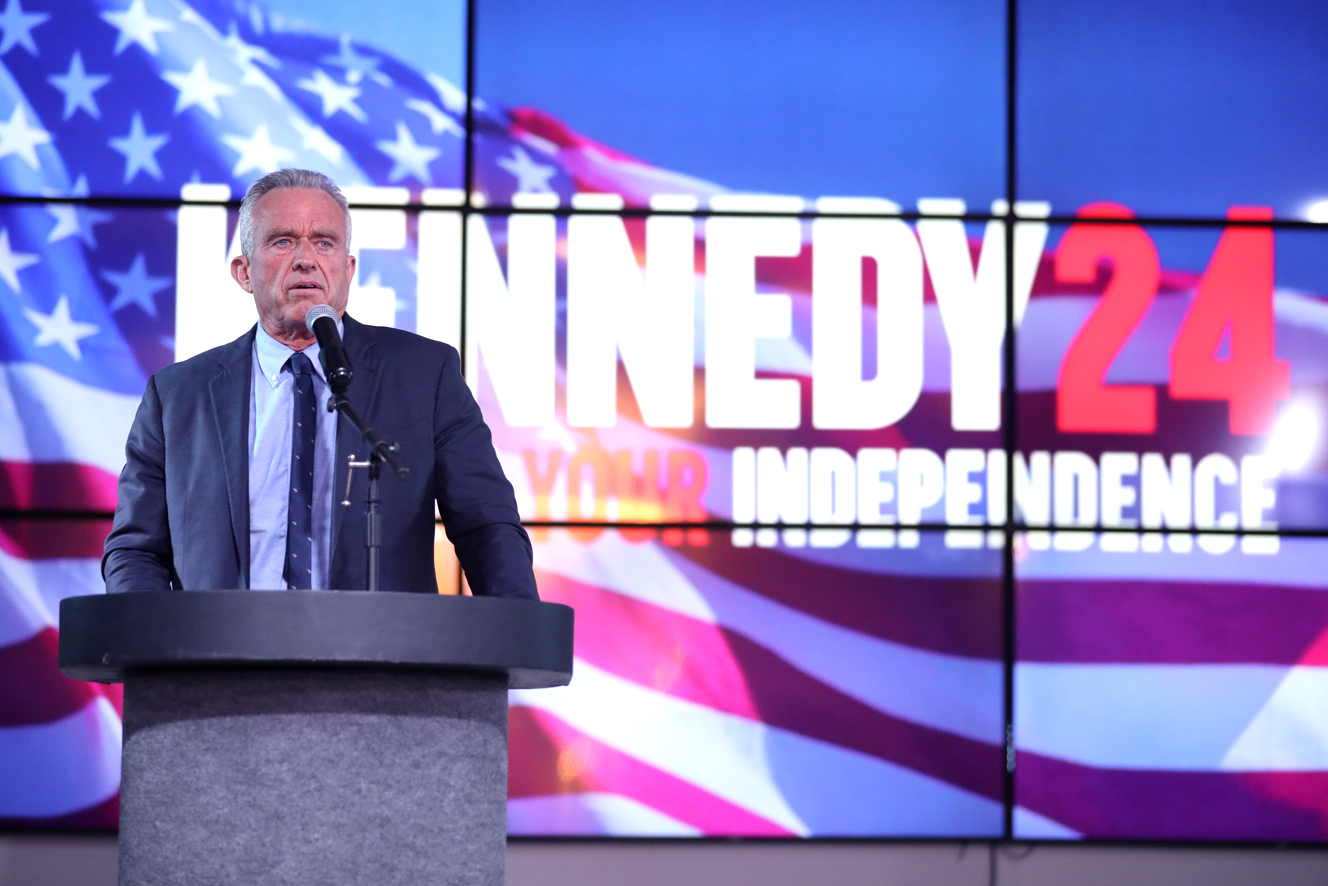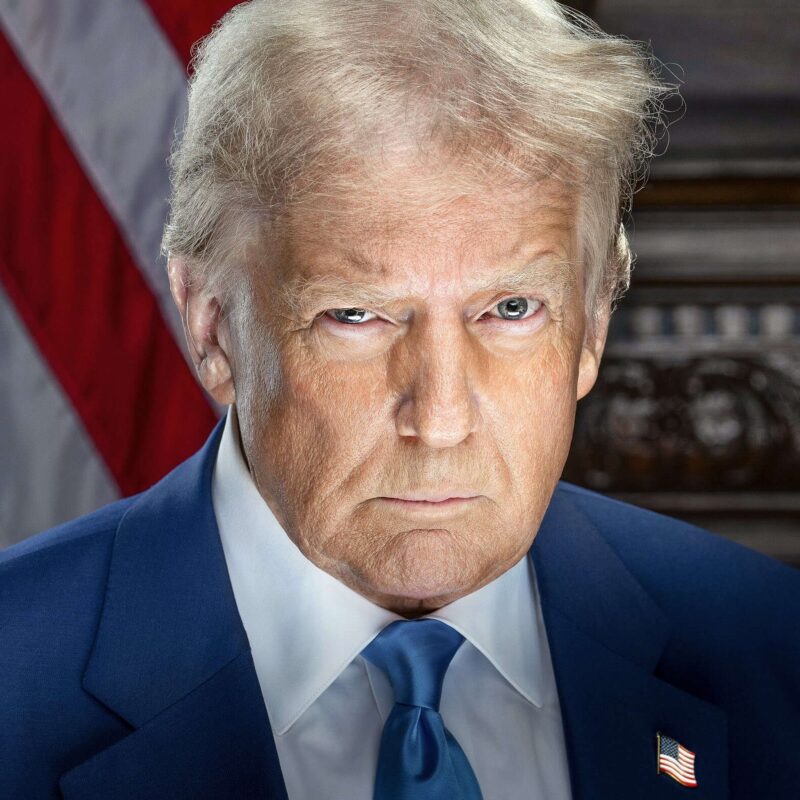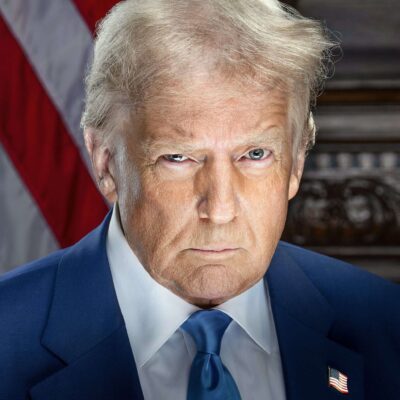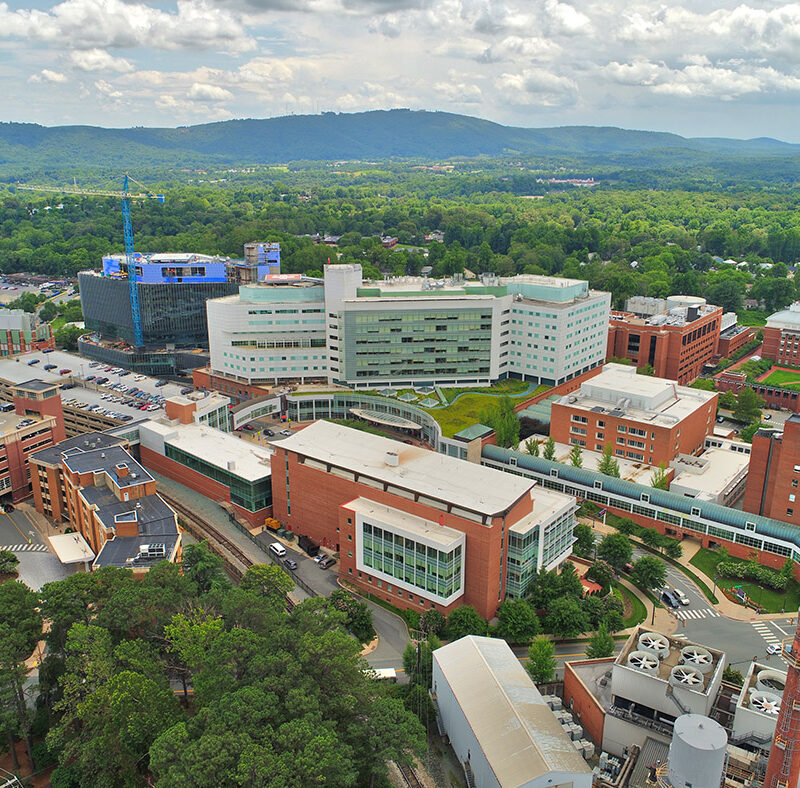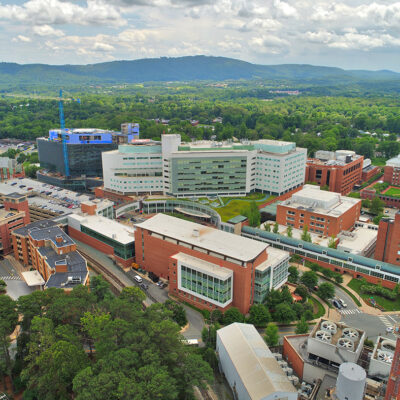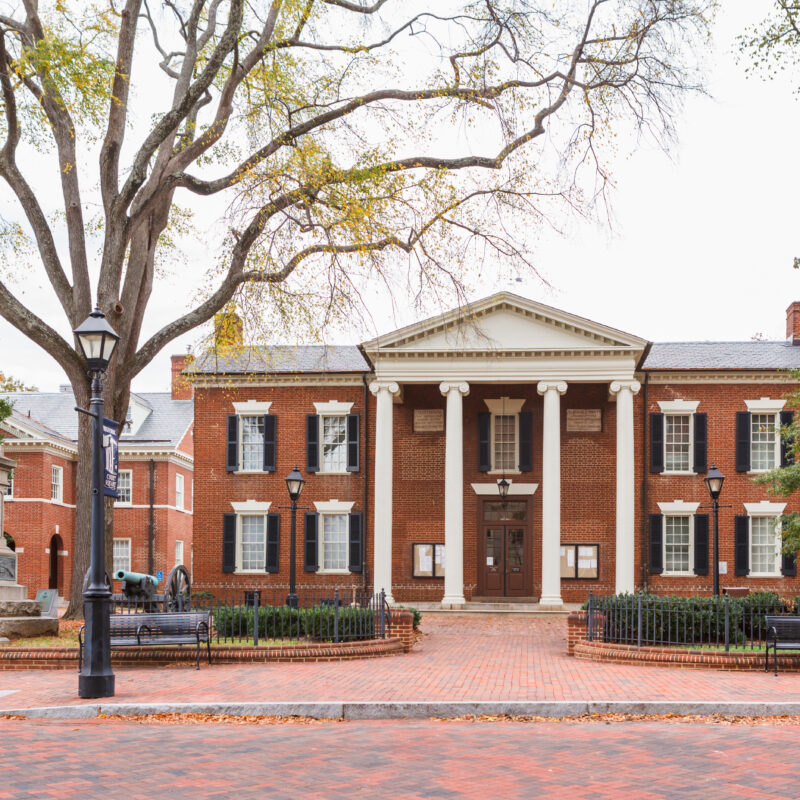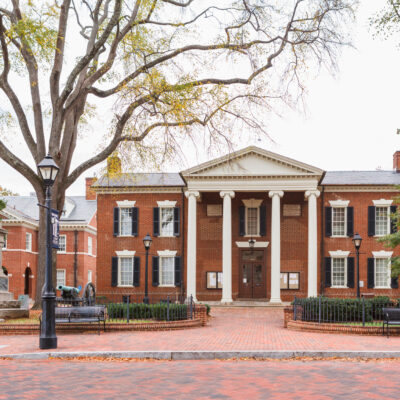It was warm for February, warm enough to make me worry about the Antarctic penguins and the bills I’ll get from Dominion Energy this summer, when I met with Jason Amatucci at the Virginia headquarters of the Robert F. Kennedy Jr. presidential campaign. Amatucci, a Charlottesville native, is the campaign’s Virginia field director, and when I emailed him to ask for an interview, he replied in seven minutes: “We can do it at HQ which is the old cville weekly office lol.”
If you’ve strolled the Downtown Mall recently, maybe you’ve peeked inside the cavernous brick-lined room where the Kennedy campaign has set up shop and which generally appears empty. But when I arrived that Thursday evening, Amatucci was visible through the windows, sitting in an armchair next to a plush couch on a small area rug—a little DIY talk show set—and when I entered, I walked directly underneath the C-VILLE sign, still mounted on the building’s façade like an effigy.
The Robert F. Kennedy Jr. origin story goes like this: Born an American blue blood, he transcended a chaotic upbringing that included the assassination of his uncle, President John F. Kennedy, when he was 9, the assassination of his father, Senator Robert F. Kennedy, when he was 14, multiple expulsions from various boarding schools, a cannabis possession charge, a heroin possession charge, an undergraduate degree from Harvard, and a law degree from the University of Virginia before making a name for himself as an environmental litigator who sued prominent corporate polluters (Monsanto, DuPont) and won.
Over the decades, however, Kennedy’s focus has drifted from pollutants in our environment to so-called toxins in our vaccines, and his environmentalist credentials have, for many, become overshadowed by the anti-vaccine conspiracy theories he continues to espouse. Now he’s running for president as an independent because the Democratic National Committee refused to hold a primary that would pit President Joe Biden against anyone else.
But that’s another story.
“C-VILLE Weekly?” said Amatucci as I sat down across from him. Before I could start recording our conversation, he was off, galloping through a long list of Kennedy’s campaign priorities as if he was afraid that I was going to interrupt him: “Clean water, clean air, keeping corporations in check, whether they be big ag or big pharma … reduce the poisons that are in the agriculture, in the rivers … and vaccines as well.”
“That was quick,” I thought. My pre-interview impression had been that the Kennedy campaign was trying to minimize Kennedy’s anti-vaccine rhetoric in an attempt to appeal to a wider population. It’s a strategy that could be highly effective, according to Professor T. Kenny Fountain, who teaches rhetoric and writing at UVA, and studies how the media we consume affects our beliefs. “Belief in a conspiracy theory is not an all or nothing proposition,” he says.

“Someone doesn’t necessarily go from 100 percent believing in vaccines to 100 percent not believing in them,” adds Fountain. “There’s a gradual process of having your ideas shaped and then eventually changed. You have to encounter messaging that slowly erodes your belief.”
For instance, says Fountain, it’s “very easy to hate on big pharma,” so anti-vaccine rhetoric might veil itself with critique of the pharmaceutical industry, because connecting to a larger concern can form a “bridge that gets people to move closer and closer to that belief.”
With this strategy in mind, I asked Amatucci if he felt like the campaign is intentionally trying to connect environmental pollution to vaccine additives for people. Sure enough, he immediately denied that the campaign wanted to draw that connection. But at the same time, he seemed to encourage me to make the connection for myself.
“It’s not anti-vax. It’s vaccine safety,” Amatucci said, and added an anecdote about Kennedy not being called anti-fish because he was trying to get mercury out of fish so that people could eat fish safely.
I wanted to say that while a healthy choice, eating fish cannot curb a pandemic or spare children from dying of measles, but I didn’t.
Writing about conspiracy theories requires a delicate balance of respect and respectful incredulity. In my effort to do it well and not get canceled or doxxed, I found myself reading The Debunking Handbook 2020, a resource written by a long list of academics and made publicly available online in an effort to combat the spread of misinformation.
Here’s a summary: Responsible journalists don’t repeat misinformation because it tends to stick. Even if you’re saying it so you can point out what’s wrong with it, you might end up unintentionally legitimizing it for people. If you absolutely have to acknowledge misinformation, cautious journalists can do it using a “truth sandwich,” where writers surround the misinformation with facts to debunk it before it can take root.
For example: Modern vaccines save lives and are safe for the vast majority of people. Some people find the idea of vaccines disturbing and overemphasize the dangers associated with them. While vaccines, like anything we put into our bodies, can occasionally have side effects, they are almost always mild and temporary. Vaccines are one of the most powerful tools we have to keep ourselves and our communities healthy, and their safety has been demonstrated over decades of research and use.
But while truth sandwiches can provide crucial context, they can also distance us from the reality of an encounter with misinformation.
Talking to Amatucci was a profoundly disorienting experience. He’d say a couple things that I honestly agreed with, such as, “Pharmaceutical companies don’t always tell us the truth.” Or “They’ve made tons of money from the COVID-19 vaccine.” Or “If you’re polluting a river, you need to be held responsible.” And then, just as I began to feel at ease, he’d hit me with a piece of misinformation, like an allusion to the well-disproven theory that vaccines can cause autism in children, and before I had a chance to fully register what he said, Amatucci would have pivoted away from the misinformation and back to things like how Kennedy wants to legalize psilocybin and cannabis. You know, things that young(ish) people like me want to hear. It felt like the misinformation was being packaged in such a way to allow it to sneak into the conversation as surreptitiously as possible, like Amatucci was making his own version of a truth sandwich.
Misinformation “doesn’t need to be masked, but that doesn’t mean it isn’t,” says Fountain. When masked, the message serves as a kind of gateway, an invitation to dive further down the so-called rabbit hole. Indeed, when I asked Amatucci if it would be possible for me to get a quote from Kennedy for this piece, he said no—instead, he recommended that I listen to Kennedy’s interview on Joe Rogan’s podcast, “The Joe Rogan Experience,” which has become notorious in recent years for allegedly spreading COVID-19 conspiracy theories and misinformation.
By the end of the interview, I worried I’d fallen for something just by being there. I felt tormented by the possibility that by not screaming at Amatucci when he said he doesn’t “dismiss immediately” the idea that Jewish people are somehow more immune to COVID-19, echoing similar comments made by Kennedy, I’d somehow absorbed some of that worldview and become complicit.
This is cognitive dissonance in action, according to Matt Motyl, a data scientist and media researcher who has a Ph.D. in social psychology from UVA.
“We want to believe that the people we surround ourselves with are smart,” says Motyl, and so “when those people start doing things that don’t fit with the expectation of what smart or good is, then we have to wrestle with it.” Usually the easiest response is to accept their opinion and integrate it into your own.
Is there a middle ground? A position between accepting someone’s bigoted views and refusing to listen to anything they have to say? I honestly don’t know. It’s a bit like trying to separate the art from the artist. When I asked Alexander Szarka and Cameron Mayhew, students at the University of Virginia School of Law who organized an on-Grounds fireside chat with Kennedy in late January, if they thought it was possible to separate the misinformation from the candidate, they said it was.
“It’s not that we fully agree with [Kennedy’s] views,” Mayhew says, but that they thought it would be “cool” to hear from “UVA Law’s most high-profile alum.”
The idea that we can appreciate Kennedy’s environmental advocacy or the titillating stories he can tell about his family without absorbing his misinformation is tempting. But according to Fountain, it doesn’t really matter whether we actually believe Kennedy’s claims about vaccines—when it comes to conspiracy theories, it’s the repetition, normalization, and connection to pre-existing beliefs that’s key.
When I asked Mayhew and Szarka if they were concerned about platforming Kennedy’s anti-vaccine rhetoric, Szarka says they are studying law, not medicine. (Both are fully vaccinated, and not overly concerned about the health risks associated with vaccines.) According to Szarka, the only palpably uncomfortable moment was when Kennedy voiced his support for Israel’s continued assault on Gaza. (The Daily Progress quoted Kennedy as saying, “All this stuff about [Israel] being an apartheid state is propaganda.”)
Instead of spotlighting Kennedy’s shortcomings, Mayhew and Szarka prefer to focus on what they feel is Kennedy’s strength—his understanding of the issues that most concern a younger, more disillusioned group of voters.
“Young people are frustrated with the lack of opportunities compared to their parents’ generations,” says Szarka. Mayhew adds that they were “pleasantly surprised” by the “overwhelming positive response” from the approximately 400 attendees to Kennedy’s fireside chat.
“We, as social beings, are motivated to believe stuff that we see that supports our preferred beliefs and attitudes,” says Motyl. “For the most part, people aren’t motivated to find the truth. It’s not because people don’t want correct information. It’s because most things in life are really complicated. … Very few people can be an expert in even one area, let alone all of them.”
I want to believe that what Motyl said doesn’t apply to me, or to anyone who considers themself an advocate for truth. So when I spoke to Kirk Bowers, a long-time Charlottesville resident, environmental activist, and former chair of the 5th District Democratic party, I felt heartened at first when Bowers immediately declared “it would be a waste of a vote to vote for Kennedy.”
But he continued, “I’m concerned that his campaign could draw votes away from Biden at a critical time in our nation’s history when we need everyone on board to protect and preserve our democracy. He could be a spoiler, and that’s what I fear more than anything.”
While Bowers maintained that Kennedy has “a lot of disadvantages,” he also says there are groups in Charlottesville that support some of Kennedy’s environmental policies—and he agrees with some of those policies himself.
According to a January Economist/YouGov poll, 45 percent of American adults have a favorable or very favorable opinion of Kennedy (although only 1 percent said they’d vote for Kennedy in an election that included Biden and Donald Trump). It seems that Kennedy still has some cultural clout, regardless of whether his opinions are based in fact—although whether this clout will translate into votes is still unclear.
But my concern isn’t that Kennedy’s going to win the presidency. It’s that he’s proving in real time that for all we liberals talk about caring about the facts, we refuse to completely disregard someone who is willing to promote misinformation if they are supposedly on our team.
And this makes sense, because Americans have “less trust in government and media and pretty much all institutions now,” says Motyl. This distrust has created an environment where people are “more likely to be searching for meaning.”
“It isn’t necessarily that we excuse certain kinds of conspiracy theories, though sometimes we do,” says Fountain, because “people understand that conspiracy theories exist along a spectrum.”
“There is no easy litmus test to know when something is a conspiracy theory or actual conspiratorial politics,” Fountain adds, citing the Iran-Contra affair and Watergate as examples of things that “sound made up, but actually happened.” (Although Fountain did provide one helpful test that he will sometimes use: “If you’re blaming a powerful group of Jews, you’re probably in a conspiracy theory.”)
We are especially susceptible to believing misinformation, Motyl says, when there’s a major existential threat, such as a global pandemic, or the perceived “death of American values,” or climate change.
Here’s an uncomfortable truth: Despite being a scientist who wholeheartedly believes that science has done an immeasurable amount of good for society, I can still feel the pull of Kennedy’s skeptical rhetoric. It’s appealing because he seems to not only think things are truly awful, but he goes even further than I am willing to go—and it sucks to admit it, but there’s a comfort in that. Because even though my rational scientist brain knows that Kennedy’s claims are without evidence, often bigoted, and threaten to undermine the very field that I myself work in, my angry, sad, terrified lizard brain thinks that maybe if Kennedy really thinks things are that bad, he will actually change them.
When I admit this to Fountain, he says this feeling can be intentionally induced. While the term conspiracy theorist is generally considered stigmatizing, it can be reclaimed as a “badge of honor” when people feel like being a skeptic puts them in touch with “the kind of knowledge that the normal person doesn’t have … if they feel it connects them to maybe being a ‘seeker,’ being particularly smart, being inquisitive, or having a questioning mind.”
Call me a conspiracy theory apologist if you want, but I don’t think it makes you a bad person if you are willing to question the decisions made by the U.S. government about public health. For instance, on March 1, the CDC dropped its recommendation that people isolate themselves when they contract COVID-19. Wondering if capitalist interests played a role in that decision doesn’t make me a conspiracy theorist; it makes me angry.
But anger is fuel for power, and unacknowledged anger becomes misdirected anger. “Every woman has a well-stocked arsenal of anger potentially useful against those oppressions, personal and institutional, which brought that anger into being. Focused with precision it can become a powerful source of energy serving progress and change,” said Audre Lorde, in her 1981 speech, The Uses of Anger. Lorde continued, “and when I speak of change, I do not mean a simple switch of positions or a temporary lessening of tensions, nor the ability to smile or feel good. I am speaking of a basic and radical alteration in those assumptions underlining our lives.”
If one person’s anger, used intentionally and well, can do that, what can our anger do when gathered like bundles of wheat by someone who sees it lying in the dirt, unharvested?
Bowers took the long way on his journey to becoming an environmental activist: After serving in the army during the Vietnam War, he had a successful career as a civil engineer working on infrastructure and development projects—not unlike the very projects that Bowers later protested with environmental conservation groups.
So what changed? “I evolved,” says Bowers, “and I saw a lot of things in my career that weren’t right.” These things energized his activism and influenced his views, and after getting laid off during the recession in the mid-2000s, he started working for the Sierra Club. He eventually co-founded Mountain Valley Watch, and used his engineering training to review the construction plans for the Mountain Valley Pipeline in an effort to mitigate its environmental impact.
“I found the plans really bad,” Bowers says, then proudly adds that he was right: The pipeline’s constructors were eventually fined $2.2 million for environmental violations, the largest fine in the state’s history.
I asked Bowers if he felt like Charlottesville is the type of place where you can feel supported to change your views, and he said he did, because the caliber of activism in Charlottesville is particularly high—lots of nice, energetic, organized people to “work with, and share ideas, and reinforce each other.”
Bowers’ decades-long evolution from infrastructure engineer to environmental watchdog sounds almost utopic; an unattainable luxury in today’s frenzied media environment. I can’t help but wonder if there’s a civil engineer out there right now who’s about to embark on a similar journey of their own, but with a very different result.
In early February, I, like many other Taylor Swift fans, did something I’d never done before: watched the Super Bowl. So when a retro-styled campaign ad with a catchy “Kennedy Kennedy Kennedy” jingle came on, I saw it live.
If I could go back and see that Super Bowl ad for the first time, knowing what I know now about how our anger and fear gets exploited, and how misinformation gets repackaged for mass consumption, I’d be able to see the ad for what it was. I’d call it an obvious attempt to not only connect Kennedy to his family’s political legacy for older voters, but to also appeal to a younger demographic that fetishizes a certain “vintage” aesthetic, nostalgic for something we never had.
We get you, the ad seemed to be trying to say. We alone understand how much you want something that seems hopelessly out of reach.
It looks silly to me now, and if I could go back, my response to the ad would be to laugh and say, look how blatantly they are trying to ensnare us. That kind of obvious pandering could never work on me.
But I didn’t know any of that at the time. So when the ad ended, I just thought “cute song,” and went back to scrolling through Twitter while waiting for Taylor to appear, my defenses just a little bit lower than they were before.
